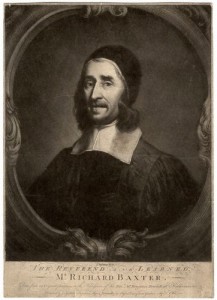
Richard Baxter was a religious pamphleteer born in Shropshire in 1615. Baxter’s father was known in his community for “for reading Scripture … and for praying … in his House, and for reproving Drunkards and Swearers, and for talking sometimes a few words of Scripture and the Life to come” (Oxford Dictionary of National Biography). Baxter remembered his father’s holy living in his book “Reliquiae Baxterianae,” and he later became a professed Nonconformist (ODNB). His life and work is notable because Baxter refused patrimony to a specific denomination. In mid seventeenth century denominations developed rapidly and religious personae were typically persuaded to align with one of the Dissenters if not with the Royalists or Parliamentarians. Baxter openly denounced sectarianism, the Church of England, episcopacy, and he thought all aspects of church government as subservient to the purposes of religion (ODNB).
Due to fact that Baxter’s father was entangled in debts, he was unable to get a formal education. His early education was dispensed by clergy and in 1632 he went to study under the chaplain of Ludlow Castle. In 1638 Baxter became the master of the grammar school in Dudley. During his tenure at Dudley, Baxter refused an oath tying him to the Church of England. He became increasingly disposed to the notion that denominations and Dissenters had deleterious effects on the true purpose of religion. In 1641 Baxter became the minister of the Kidderminster district. He affected great change in the diocese, noting that “when I came thither first, there was about one Family in a Street that worshipped God and called on his name,” but “when I came away there were some Streets where there was not past one Family in the Side of a Street that did not so” (ODNB). During this period Baxter focused on his pastoral duties and encountered no legal conflicts. He composed The Reformed Pastor, in which he highlights the requirements for a holy church. Baxter emphasized catechizing, Puritan evangelism, plain preaching, and attempted to rectify pastoral neglect (ODNB). In 1642 Baxter refused an offer from Cromwell to be the chaplain to the Ironsides. He recommended Protestation, the notion that war might be averted, due to the belief that he had “Liberty and Advantage to preach [the] Gospel with Success” with Charles as king (ODNB). In this period, Baxter’s Nonconformist ideology was increasingly evident. He wrote that “Sin and Folly and Mischief of all Sects that would appropriate the Church to themselves” (ODNB). In 1651 he wrote Plain scripture proof of infants church-membership and baptism, a treatise against the Dissenters. The treatise denounced the works of Dissenters as divisive to the unity of the church. He accused notable Ranter Abiezer Coppe of “Satanicall delusions” and “spreading blasphemies” (ODNB). Baxter’s criticism of Dissenters highlights his belief that the church out to be united in their efforts to reform the church rather than divide altogether. This aspect of Baxter’s teaching is most evident in his enduring the political complexity following the death of Charles.
Baxter is a remarkable figure during the Interregnum period because he was one of the few that chose Nonconformism during a time that one’s political allegiance was a safeguard against professional or bodily threat. He advocated a comprehensive English church but argued that the Church of England required substantial alterations. Although his aim was “promoting church unity,” Baxter refused to accept “A church which insists upon compliance with a particular liturgical or ecclesiological form” (ODNB). Instead, he sought to bring illuminate the inherent inequality in ecclesiastical hierarchy. Baxter’s Nonconformism disagreed church doctrine but he maintained a first resolve to form a comprehensive English church, saying “I am against all Sects and dividing Parties…I am of that Party which is so against Parties: If the Name of CHRISTIAN be not enough, call me a CATHOLICK CHRISTIAN” (ODNB). Baxter preached in London until the Act of Uniformity in 1662. He refused patronage under the Church of England and became a moderate Dissenter. From 1662 to 1672, Baxter was frequently fined for unlicensed preaching. In 1672 Baxter applied for a license to preach and was recorded as “a mere Nonconformist” (ODNB). From 1672 to his death in 1691, Baxter openly preached free-will doctrines and was charged and fined for sedition multiple times due to his polemics. He wrote three theological tracts, Christian Directory, the Methodus Theologiae Christianae, and the Catholic Theology, which outlined his theological persuasion. Baxter, in true Nonconformist spirit, denounced many points of Calvin’s doctrine. His outspokenness made him ostracized amongst Dissenters and mainstream Anglicans alike (ODNB). He wrote 130 books, mostly “exercises in homiletic, catechetical, practical, or controversial divinity” (ODNB).
Matt Smith
Works Cited
Hessayon, Ariel. “Coppe, Abiezer (1619–1672?).” Oxford Dictionary of National Biography,
Oxford University Press, 2004. Web. Jan 2008 http://www.oxforddnb.com/view/article/6275, accessed 20 Sept 2014
Keeble, N.H. “Baxter, Richard (1615–1691).” Oxford Dictionary of National Biography, Oxford
University Press, 2004. Web. Oct 2009 http://www.oxforddnb.com/view/article/1734, accessed 20 Sept 2014